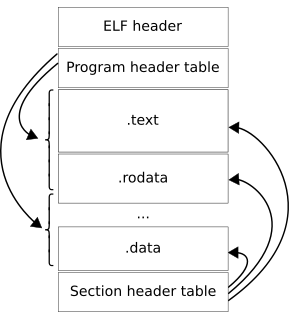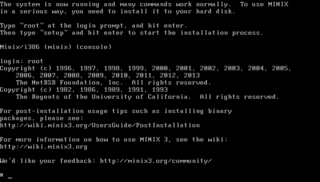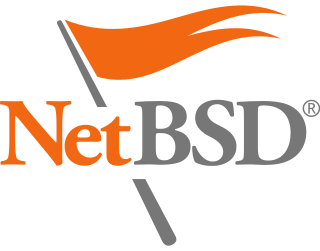
Andrew Stuart Tanenbaum, sometimes referred to by the handle ast, is an American-Dutch computer scientist and professor emeritus of computer science at the Vrije Universiteit Amsterdam in the Netherlands.

In computing, the Executable and Linkable Format, is a common standard file format for executable files, object code, shared libraries, and core dumps. First published in the specification for the application binary interface (ABI) of the Unix operating system version named System V Release 4 (SVR4), and later in the Tool Interface Standard, it was quickly accepted among different vendors of Unix systems. In 1999, it was chosen as the standard binary file format for Unix and Unix-like systems on x86 processors by the 86open project.

The GNU Compiler Collection (GCC) is an optimizing compiler produced by the GNU Project supporting various programming languages, hardware architectures and operating systems. The Free Software Foundation (FSF) distributes GCC as free software under the GNU General Public License. GCC is a key component of the GNU toolchain and the standard compiler for most projects related to GNU and the Linux kernel. With roughly 15 million lines of code in 2019, GCC is one of the biggest free programs in existence. It has played an important role in the growth of free software, as both a tool and an example.

Minix is a Unix-like operating system based on a microkernel architecture. Since version 2.0, it has been Portable Operating System Interface (POSIX) compliant.
In computing, cross-platform software is computer software that is designed to work in several computing platforms. Some cross-platform software requires a separate build for each platform, but some can be directly run on any platform without special preparation, being written in an interpreted language or compiled to portable bytecode for which the interpreters or run-time packages are common or standard components of all supported platforms.
Bytecode, also termed p-code, is a form of instruction set designed for efficient execution by a software interpreter. Unlike human-readable source code, bytecodes are compact numeric codes, constants, and references that encode the result of compiler parsing and performing semantic analysis of things like type, scope, and nesting depths of program objects.
In software engineering, porting is the process of adapting software for the purpose of achieving some form of execution in a computing environment that is different from the one that a given program was originally designed for. The term is also used when software/hardware is changed to make them usable in different environments.
A cross compiler is a compiler capable of creating executable code for a platform other than the one on which the compiler is running. For example, a compiler that runs on a PC but generates code that runs on an Android smartphone is a cross compiler.
A programming tool or software development tool is a computer program that software developers use to create, debug, maintain, or otherwise support other programs and applications. The term usually refers to relatively simple programs, that can be combined to accomplish a task, much as one might use multiple hands to fix a physical object. The most basic tools are a source code editor and a compiler or interpreter, which are used ubiquitously and continuously. Other tools are used more or less depending on the language, development methodology, and individual engineer, often used for a discrete task, like a debugger or profiler. Tools may be discrete programs, executed separately – often from the command line – or may be parts of a single large program, called an integrated development environment (IDE). In many cases, particularly for simpler use, simple ad hoc techniques are used instead of a tool, such as print debugging instead of using a debugger, manual timing instead of a profiler, or tracking bugs in a text file or spreadsheet instead of a bug tracking system.
The GNU toolchain is a broad collection of programming tools produced by the GNU Project. These tools form a toolchain used for developing software applications and operating systems.
LLVM is a set of compiler and toolchain technologies, which can be used to develop a front end for any programming language and a back end for any instruction set architecture. LLVM is designed around a language-independent intermediate representation (IR) that serves as a portable, high-level assembly language that can be optimized with a variety of transformations over multiple passes.
In software engineering, retargeting is an attribute of software development tools that have been specifically designed to generate code for more than one computing platform.
This is a list of assemblers: computer programs that translate assembly language source code into binary programs. Some assemblers are components of a compiler system for a high level language and may have limited or no usable functionality outside of the compiler system. Some assemblers are hosted on the target processor and operating system, while other assemblers (cross-assemblers) may run under an unrelated operating system or processor. For example, assemblers for embedded systems are not usually hosted on the target system since it would not have the storage and terminal I/O to permit entry of a program from a keyboard. An assembler may have a single target processor or may have options to support multiple processor types. Very simple assemblers may lack features, such as macros, present in more powerful versions.

The Tanenbaum–Torvalds debate was a written debate between Andrew S. Tanenbaum and Linus Torvalds, regarding the Linux kernel and kernel architecture in general. Tanenbaum, the creator of Minix, began the debate in 1992 on the Usenet discussion group comp.os.minix, arguing that microkernels are superior to monolithic kernels and therefore Linux was, even in 1992, obsolete. The debate has sometimes been considered a flame war.

Minix 3 is a project to create a small, high availability, high functioning Unix-like operating system. It is published under a BSD-3-Clause license and is a successor project to the earlier versions, Minix 1 and 2.
Clang is a compiler front end for the C, C++, Objective-C, and Objective-C++ programming languages, as well as the OpenMP, OpenCL, RenderScript, CUDA, and HIP frameworks. It acts as a drop-in replacement for the GNU Compiler Collection (GCC), supporting most of its compilation flags and unofficial language extensions. It includes a static analyzer, and several code analysis tools.

A Unix-like operating system is one that behaves in a manner similar to a Unix system, although not necessarily conforming to or being certified to any version of the Single UNIX Specification. A Unix-like application is one that behaves like the corresponding Unix command or shell. There is no technical standard defining the term, and opinions can differ about whether or the degree to which a particular operating system or application is Unix-like.

Unix is a family of multitasking, multiuser computer operating systems that derive from the original AT&T Unix, whose development started in 1969 at the Bell Labs research center by Ken Thompson, Dennis Ritchie, and others.
The EM intermediate language is a family of intermediate languages created to facilitate the production of portable compilers. The language's specifications were created by Andrew Tanenbaum, Hans van Staveren, Ed G. Keizer, Johan W. Stevenson and they were implemented in the Amsterdam Compiler Kit (ACK).

NetBSD is a free and open-source Unix-like operating system based on the Berkeley Software Distribution (BSD). It was the first open-source BSD descendant officially released after 386BSD was forked. It continues to be actively developed and is available for many platforms, including servers, desktops, handheld devices, and embedded systems.








